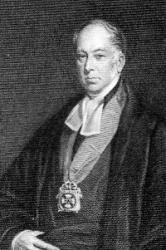
1787 - 1863 Person Name: Archbishop Whately Topics: Saints' Days and Other Holy Days St. Michael and All Angels, September 29 Author (2nd stanza) of "God, that madest earth and heaven" in The Book of Common Praise Whately, Richard, D.D., born in London, Feb. 1, 1787; educated at Oriel College, Oxford; Bampton Lecturer, 1822; Principal of St. Alban's Hall, Oxford, 1825; and Archbishop of Dublin, 1831. He died in Dublin, Oct. 8, 1863. His association with hynmody is very slight. In 1860 he published his Lectures on Prayer, in which were several translations of German hymns by his eldest daughter, Miss Emma Jane Whately. Dean Dickinson, from whom we have received this information, also says that the Archbishop's hymn "Thou to Whom all power is given" (Lent), was written circa 1830. It was first published in the 1st edition of the Irish Church Hymnal, 1855. The Archbishop's youngest daughter, Blanche, was also a writer of hymns.
--John Julian, Dictionary of Hymnology, Appendix, Part II (1907)
Richard Whately


 My Starred Hymns
My Starred Hymns



